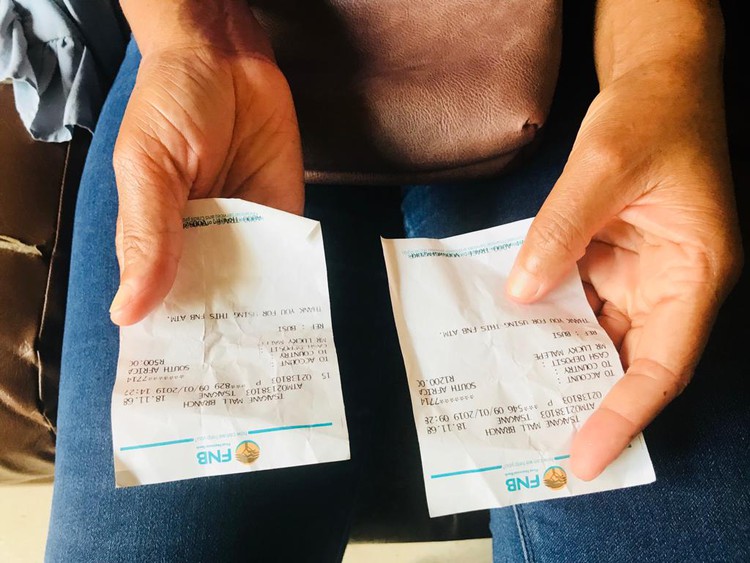Unemployed, poor and desperate: the perfect prey for con-artists
“I was lucky to get work after paying before, but this time my money is gone for mahala”
Busi Masango started the new year with high hopes only to be scammed by con-artists posing as employment agents.
Masango is an unemployed single mother who rents a room in Tsakane township in Ekurhuleni. In January she came across an online advert for a cleaning job at Transnet in the East Rand. She called the number on the site and spoke to a man who called himself Sibusiso.
“On the site the number was under ‘Mr Marcus’. l was surprised when the man spoke Zulu. He told me that all the cleaning vacancies at Transnet had been filled,” said Masango. “But he said if I gave him R1,500 he would get me a job at Kingsley Beverages or Kelloggs instead.”
She said she was wary when the man asked for money but decided to take a chance. “He said that l would earn R3,000 a week. This tempted me and I decided to pay him a deposit of R300.” She received an SMS with ABSA bank details and made the deposit.
“Immediately after depositing the money he sent an SMS saying I had to give him the balance or else there would be no job.” Masango said when she phoned Sibusiso he mocked her for not paying the full amount. She said Sibusiso laughed and told her, “That’s why l don’t like to deal with people in Tsakane, they are too poor to pay the money.”
Desperate for work she decided to take the money from her son’s school savings. She was sent bank details for an FNB account where she deposited the balance of R1,200.
After paying the balance she was asked for another R3,000. “I was sceptical … But something inside me said that if l didn’t pay the money l would miss out on an opportunity to get the job which l desperately needed.”
When she told the man that she could not afford to pay the amount, she was given an option to pay R500 and pay the rest from her salary. She deposited R500 in the FNB bank account. She never heard from the man again.
“l called all the numbers and sent SMSes but no one responded. I regret using the savings l had kept for my son’s schooling. He does not have stationery as we speak.”
Masango said she was ashamed to tell anyone about it or report to the police.
“Being a woman, life for me has not been easy,” she said. “Sometimes l was asked for sexual favors in exchange for jobs. Now l have lost hope.”
Masango is not the only person in Tsakane who has been conned. Vakhele Nzishe and Themba Madhlopa paid R2,500 for security jobs that never materialised.
They said they met a man who claimed to have a connection for security jobs at the Delmas Municipality. Nzishe’s mother borrowed money from a loan shark to help him pay the man.
“I gave the man R1,500 last year but to date we haven’t been called for the job. He is now hiding from us.” Nzishe said he asked for a refund but instead he was given a handwritten duty roster and told he would soon be called for duty. It has been a year.
“The problem is that jobs in our country are now for sale. If you do not pay you might miss out,” said Nzishe. “I had to pay for all the jobs that l have worked in the past. I was lucky to get work after paying before, but this time my money is gone for mahala.”
Madhlopa paid R1,000 and is also waiting to be called for the job. Neither Madhlopa nor Nzishe have reported the matter to the police. “How do you report giving money away during these hard times? You will be a laughing stock,” Madhlopa said.
Unemployment in South Africa has risen steadily over the past decade. The latest Quarterly Labour Force Survey released by Statistics South Africa reveals that the country’s unemployment rate was 27.5% in the third quarter of 2018. This is up from 21.5% at the same time in 2008.
Support independent journalism
Donate using Payfast

Next: Cape Town’s strained transport service for disabled people
Previous: Rental Tribunal sends clear message to landlords: Don’t treat tenants unfairly
© 2019 GroundUp.
This article is licensed under a Creative Commons Attribution-NoDerivatives 4.0 International License.
You may republish this article, so long as you credit the authors and GroundUp, and do not change the text. Please include a link back to the original article.

